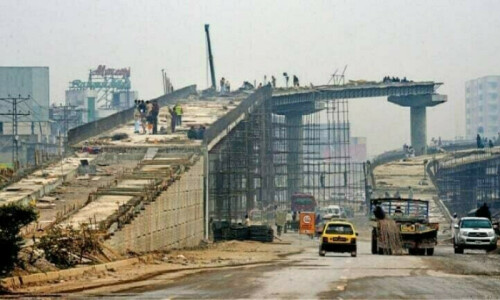Pakistan’s UN Ambassador Munir Akram on Wednesday warned the UN Security Council of a “serious threat of terrorism within and from Afghanistan”, emphasising that Tehreek-i-Taliban Pakistan (TTP) was fast emerging as an “umbrella organisation” with potential of causing regional destabilisation.
The banned TTP, a separate group but aligned with the Afghan Taliban, had escalated attacks on Pakistani security forces since breaking a fragile ceasefire agreement with the then-government in November 2022.
According to a statement posted on the X platform by the Permanent Mission of Pakistan to the UN, Akram, while delivering a statement in the UN Security Council meeting on the situation in Afghanistan today, pointed out the terrorism threat the TTP was posing globally.
“Ambassador Munir Akram termed the TTP, known as Fitna al Khawarij in Pakistan, as the largest terrorist organisation in Afghanistan that is conducting almost daily terrorist attacks against Pakistan with full support and protection of the Afghan Interim Government (AIG) and sponsorship of Pakistan’s major adversary,” the statement quoted Akram as saying.
Islamabad has repeatedly conveyed its concerns to the Afghan government over the presence of terror outfits, including TTP, inside Afghanistan, saying that the militants have consistently used Afghan soil to launch terror attacks inside Pakistani territory. Kabul denies the allegations.
Indicating the TTP’s potential to cause regional destabilisation, Ambassador Akram said that the terrorist group was “fast emerging as an umbrella organisation that is now coordinating with secessionist groups such as Majeed Brigade.”
“And, given its long association with Al-Qaeda, it will not be long before the TTP becomes the spearhead for Al-Qaeda’s planned regional and global terrorist goals,” Ambassador Akram warned.
He asked the world to be concerned about the threat a strengthened TTP poses in the not-too-distant future.
Akram added that Pakistan was ready to cooperate with regional and international organisations to eliminate the TTP threat and will continue to take national action against the terrorist organisation.
The envoy reaffirmed Pakistan’s dedication to supporting a peaceful and stable Afghanistan, echoing the shared aspirations of its neighboring countries and the international community for greater political inclusivity in Afghanistan.
“Pakistan firmly believes that such inclusivity is vital for enhancing the prospects of stability and normalisation within that country,” he said.
However, the Pakistan UN envoy expressed deep concern about the ongoing violations of human rights by the Afghan interim government, particularly against women and girls.
“The Afghan interim government has not only reneged on its commitments regarding women and girls but has exacerbated the situation by issuing new directives aimed at silencing their voices,” he stated.
Ambassador Akram said Pakistan strongly condemned these actions and said that “these backward measures violate the true essence of our enlightened religion, which was among the first to uphold equal rights for both men and women.”
Concern for humanitarian crisis in Afghanistan
The Pakistan envoy said that while Pakistan remained committed to constructive engagement with the Taliban regime, it was clear that the regime must not be allowed to manipulate regional and international dynamics to avoid its obligations.
He also expressed deep concern over the ongoing humanitarian crisis in Afghanistan, three years after the Taliban assumed power. He said that with 23.7 million Afghans in desperate need of humanitarian assistance, Pakistan urges the international community to provide aid without conditions.
The Afghanistan Humanitarian Needs and Response Plan, which seeks $3.06 billion in assistance, has received less than 25 per cent of the required funds, he maintained.
“Immediate action is needed to fully fund this plan,” Akram emphasised. “It is essential that all possible sources of funding are mobilized to alleviate the suffering of the Afghan people.”
In addition to addressing the humanitarian crisis, Ambassador Akram reiterated Pakistan’s support for Afghanistan’s economic revival, highlighting the urgent need to revive the Afghan banking system, resolve the liquidity crisis, and create the conditions necessary for unfreezing Afghanistan’s national reserves.
“Pakistan is committed to expanding trade and commercial relations with Afghanistan and remains a key partner in implementing regional infrastructure and connectivity projects that will enhance economic stability and growth in the region,” the Permanent Representative added.
Pakistan’s top UN diplomat urged the Afghan interim government to comply with its international responsibilities, warning that policies fostering internal, regional, and global instability cannot continue unchecked.
The international community, Ambassador Akram suggested, must not lose sight of its objectives in Afghanistan. Engagement with the Taliban must have a clear direction. “We must determine the steps necessary to establish normalcy in Afghanistan and work towards its eventual integration into the global community,” he emphasised.
Ambassador Akram said that to this end, Pakistan proposes that the international community builds on the recommendations of the Secretary-General’s Special Coordinator, Ambassador Feridun Sinirlioglu.
The report, he said, outlines a roadmap of reciprocal actions, focusing on counter-terrorism, human rights, political inclusivity, economic revival, and the easing of sanctions and political recognition.
Rise in terrorist attacks
Pakistan has experienced an increase in terrorist attacks as a total of 59 of them occurred countrywide in August compared to 38 attacks in the previous month, according to a digital database maintained by the Pak Institute for Peace Studies (PIPS), an Islamabad-based think-tank.
In Khyber Pakhtunkhwa, for instance, 29 terrorist attacks took place, claiming 25 lives and wounding 80 others. The TTP, Hafiz Gul Bahadur Group, Lashkar-i-Islam, Islamic State-Khorasan (IS-K), and a few local Taliban groups reportedly carried out these attacks.















































Dear visitor, the comments section is undergoing an overhaul and will return soon.